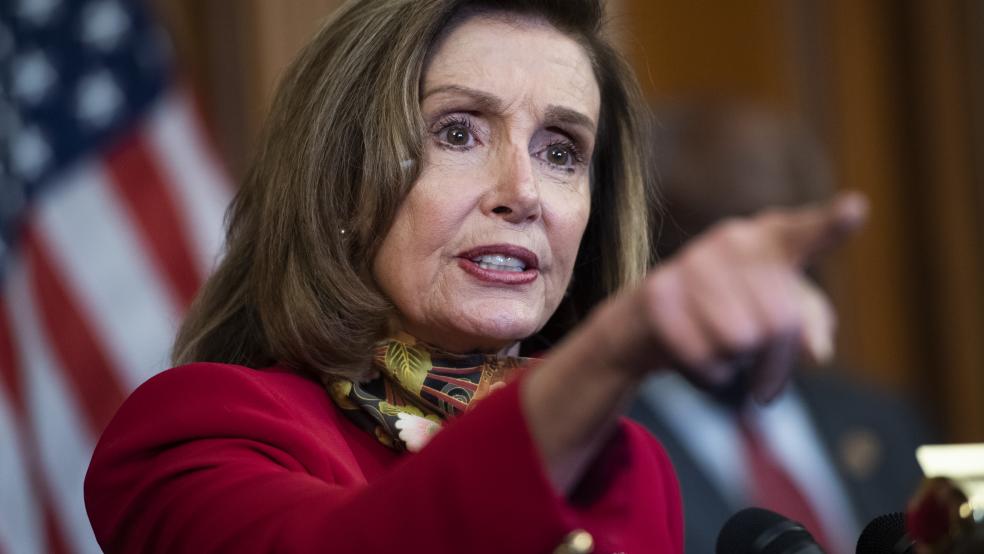With five days to go before Election Day and no chance of a coronavirus relief package getting done before then, President Trump, House Speaker Nancy Pelosi (D-CA) and Treasury Secretary Steven Mnuchin played another round of the stimulus stalemate blame game on Thursday — while still dangling hope that the legislation could get done after the election.
Trump again blamed Pelosi for the lack of a deal and promised “a very big package” right after the election. “Once we get past the election, we’re going to get it. It may be bipartisan, it may not have to be. Depending on -- if we win the House, it won’t have to be. Right after the election, we’ll get it one way or the other,” Trump reportedly said on “The Jon Taffer Podcast.”
But in a letter to Mnuchin, Pelosi indicated just how far apart the two sides remain after months of back and forth. She said that Democrats “are still awaiting the Trump Administration’s promised responses on multiple items of critical importance.”
Pelosi’s letter listed a litany of areas where the two sides still had unresolved differences, including a national strategy for coronavirus testing, tracing and treatment; aid to state and local governments; enhanced unemployment insurance benefits; child care funding; tax credits; money for schools to reopen safely; and liability protections for businesses.
“In other words,” Politico’s Anna Palmer and Jake Sherman noted, “Pelosi is suggesting Mnuchin and the administration owe her answers on nearly every contentious issue in the Covid relief package. So -- no, the two sides are nowhere close. Not at all.”
Even so, Pelosi urged Mnuchin to respond. “Your responses are critical for our negotiations to continue,” she wrote. “The President’s words that ‘after the election, we will get the best stimulus package you have ever seen’ only have meaning if he can get Mitch McConnell to take his hand off the pause button and get Senate Republican Chairmen moving toward agreement with their House counterparts.”
Mnuchin responded with a letter of his own in the afternoon, accusing Pelosi of playing politics instead of genuinely pursuing a deal. “I woke up this morning and read your letter to me in the press. Because you sent it to my office at midnight and simultaneously released it to the press, I can unfortunately inly conclude that it is a political stunt.”
Mnuchin said that, contrary to Pelosi’s claims, the administration had accepted her proposals on testing, with “minor comments,” and had responded on contact tracing as well. He accused Pelosi of refusing to compromise in other areas and hindering relief efforts by refusing to accept piecemeal legislation. “Your ALL OR NONE approach is hurting hard-working Americans who need help NOW,” he wrote.
A Pelosi spokesperson told The Washington Post that the White House had still not lived up to Mnuchin’s promise to accept language on crushing the virus and said it is “disappointing” that the administration issued Mnuchin’s letter instead of “meaningful responses to meet the needs of the American people.”
Chances of a “lame duck” deal? The speaker told reporters at her weekly press conference that she would like to reach a deal in the “lame duck” congressional session after the election, in part to allow a President Joe Biden to pursue his agenda. “I want a bill for two reasons. First and foremost the American people need help. They need real help. And second of all, we have plenty of work to do in a Joe Biden administration ... So we want to have as clean a slate as possible going into January,” Pelosi said.
But she indicated that she would not soften her demands for a comprehensive package during a lame duck session, even with the prospect of additional legislation after Biden takes office.
What it all means: Pelosi’s letter shows the negotiators didn’t make as much progress as some of their earlier comments suggested, meaning that a deal during the lame duck is far from a sure bet. “Where the talks go after the election is wholly uncertain — a comeback win would award Trump with greater leverage but a loss could also make him less invested in an agreement and less willing to compromise to get there,” Andrew Taylor of the Associated Press says.
Thursday’s GDP report may also make it harder to reach a bipartisan deal, as Republicans touted the numbers as evidence that their plans to reopen the economy have worked while Democrats said the data showed that the CARES Act passed in March helped and that more federal assistance is needed.





